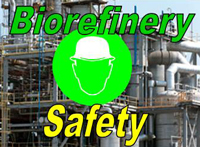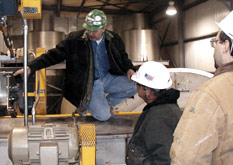 In 2010, process safety management (PSM) was the most common cited hazard at ethanol plants by OSHA (Occupational Safety and Health Administration). The data was published by Albert Patin with South Dakota State University. This year PSM citations are appearing to be on the same course as OSHA has been arriving unexpectedly at ethanol plants across the country assessing fines. More visits are expected. This is why Improving Process Safety Management is the feature of Part 4 of the Biorefinery Safety Series.
In 2010, process safety management (PSM) was the most common cited hazard at ethanol plants by OSHA (Occupational Safety and Health Administration). The data was published by Albert Patin with South Dakota State University. This year PSM citations are appearing to be on the same course as OSHA has been arriving unexpectedly at ethanol plants across the country assessing fines. More visits are expected. This is why Improving Process Safety Management is the feature of Part 4 of the Biorefinery Safety Series.
So what exactly is process safety management in the context of a biorefinery? It provides guidance on the control and use of highly hazardous chemicals (See Part 1: How to Properly Handle Chemicals in a Biorefinery), according to Nate Vander Griend with ERI, a company that has its roots with ICM dating back to 2003 and in 2006 became a stand-alone company. Vander Griend said that risk management planning is generally part of an environmental program, which ERI now provides.
“On the safety side, managing your risk is quite a bit different,” said Vander Griend. “You must get a safety program in place that not only meets OSHA requirements but exceeds them, and encompasses all the ethanol industry best practices.” He continued by explaining that there have also been property safety issues that have been a recent concern as it relates to process safety management. This encompasses how the plant is built, operated and the type of testing that happens to prevent catastrophic events such as the release of hazardous materials.
Listen to my interview with Nate Vander Griend here: Ethanol Safety Series Part IV: PSM Most Cited Ethanol Plant Hazard
 Vander Griend said ethanol plants have several OSHA requirements, but ERI believes plants need to go above and beyond OHSA requirements. ERI provides onsite facility safety audits. He said its good to have a third party onsite to identify issues and once they have spent time at the plant, they develop a comprehensive audit report. ERI performs just about 200 onsite facility inspections each year.
Vander Griend said ethanol plants have several OSHA requirements, but ERI believes plants need to go above and beyond OHSA requirements. ERI provides onsite facility safety audits. He said its good to have a third party onsite to identify issues and once they have spent time at the plant, they develop a comprehensive audit report. ERI performs just about 200 onsite facility inspections each year.
“So what we do is audit the facility from the nuts and bolts of it and develop an audit report that comprehensive,” said Vander Griend. “We identify what the issue we found was, what we would do to correct it, why, and how severe it is. Then we take that among the whole group and benchmark all the plants against each other. So you can tell where you sit in relation to the other 80 plants or so that we’re providing that service for.”
I asked Vander Griend what some of the more comment safety citations were and he said as a whole, property hazard is fairly new for the industry and it is this area where most of the problems are occurring. The new OSHA national emphasis program came about as a result of issues that have occurred at other chemical facilities. He said that PSM is a very involved process and hard to understand in terms of where the plant is supposed to be for both compliance and best practice.
The ethanol industry didn’t have the same amount of time to get to where they need to be as others in the chemical industry and quite a few facilities are being visited. Today, many of the plants are lacking on the PSM front and not meeting all the requirements. The result has been both fines as well as more attention being brought to the industry as a whole to get up to speed on compliance.
While as a whole there have only been a handful of major plant accidents, it is imperative that the industry learn more about the new OSHA program and get their plants up to speed. Companies like ERI can come in and help you improve your PSM programs, which should help to reduce the possibility of a catastrophic event.

